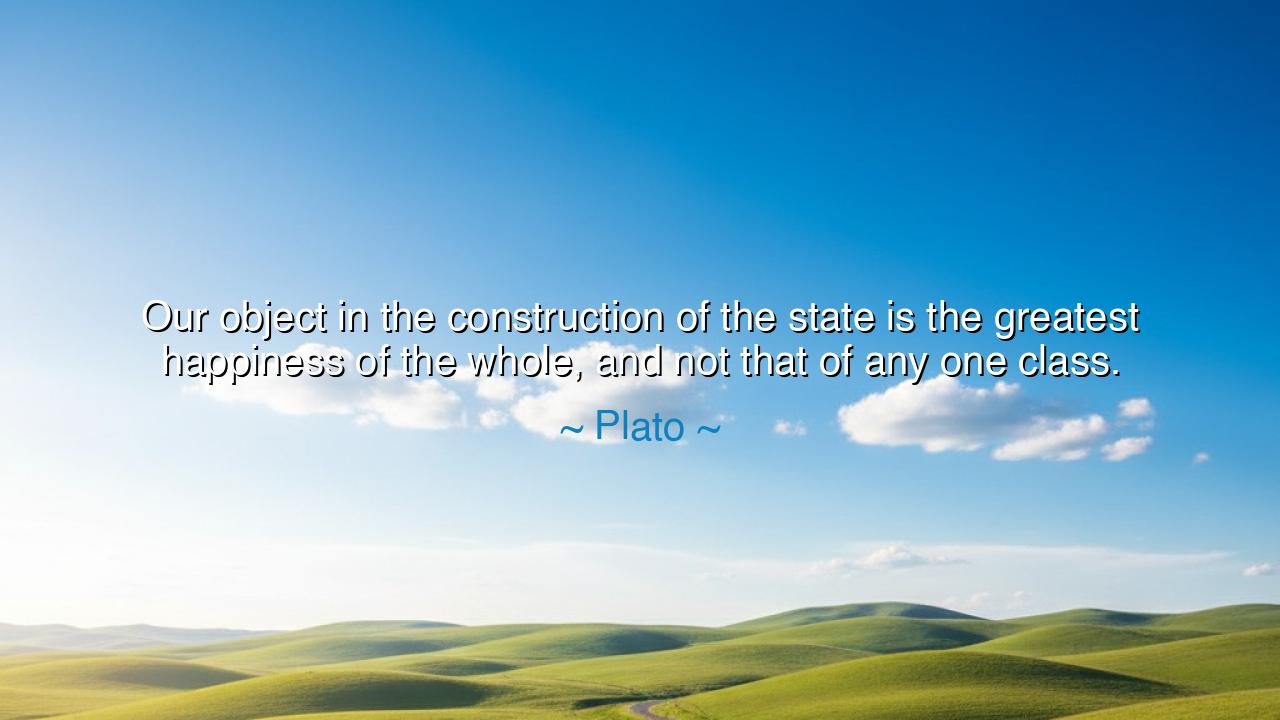
Our object in the construction of the state is the greatest
Our object in the construction of the state is the greatest happiness of the whole, and not that of any one class.






“Our object in the construction of the state is the greatest happiness of the whole, and not that of any one class.”
Thus spoke Plato, the philosopher of eternal reason, whose thoughts echo through the corridors of centuries. In this profound declaration, drawn from his timeless work The Republic, he unveils the divine blueprint of justice — that a nation’s true purpose is not the pleasure of the few, but the happiness of the whole. It is a teaching that rises above politics and reaches into the very soul of civilization: that a society is righteous only when every heart within it beats in harmony with the common good.
The origin of these words lies in Plato’s vision of the ideal state, a world governed not by greed or power, but by wisdom, virtue, and the pursuit of justice. In an age of city-states divided by wealth, ambition, and war, Plato saw how easily nations fell into decay when rulers sought their own advantage. He dreamed instead of a state founded upon balance — where the philosopher would rule with reason, the warrior would guard with honor, and the laborer would serve with dignity. In such a society, no class would exist to dominate another; rather, each would serve the harmony of the whole, as organs serve the life of the body.
To understand this vision, one must see that Plato’s word “happiness” (eudaimonia) is not the fleeting pleasure of comfort or indulgence, but the enduring joy of right order — the peace that arises when all things are in their proper place. A state, like a soul, can only know happiness when its parts are aligned with virtue. If one class seeks to enrich itself at the expense of others, the harmony is broken, and with it, the foundation of the whole crumbles. Thus, Plato teaches that justice is the harmony of the many, and happiness is its natural fruit.
History bears witness to the truth of his words. Consider the story of Solon, the wise lawgiver of Athens, who centuries before Plato sought to heal his city from the corruption of inequality. The rich had enslaved the poor, and bitterness threatened to devour the state. Solon, chosen as mediator, refused to favor any side. He canceled debts, freed the enslaved, and set laws to guard both the humble and the mighty. The powerful were angered, the poor were unsatisfied, but Athens was saved. For in serving not one class, but the whole, Solon preserved the body of the city from decay. His courage became legend, and his wisdom, the living seed of the democracy to come.
Plato’s teaching, though ancient, speaks also to our own age. We live in times where nations, like individuals, are tempted to measure success by wealth or power rather than by the well-being of all. The state, Plato reminds us, is not a machine to serve the interests of a few, but a living soul that thrives only when its people share in justice, opportunity, and peace. The farmer’s labor, the scholar’s thought, the artist’s song, the ruler’s wisdom — each must exist for the benefit of the greater harmony. When any one class hoards privilege or neglects duty, the balance is lost, and the music of the state turns to discord.
There is a moral law written deep within the heart of this teaching: that true happiness cannot exist in isolation. A man cannot be happy if his neighbor is starving; a ruler cannot prosper if his people are oppressed. The joy of the whole is the only joy that endures. When one part of society suffers, the wound spreads to all. Therefore, Plato calls upon rulers to seek wisdom, citizens to act with virtue, and all people to remember that their freedom and happiness are bound together. The state is a mirror of the soul — it becomes just when its people are just.
So, my child, learn this lesson from the philosopher of Athens: live not for the narrow happiness of your own circle, but for the greater harmony of all. If you are strong, use your strength to protect; if you are wise, use your wisdom to enlighten; if you are humble, serve with faith and joy. The good of one is fleeting, but the good of all is eternal. Build your life, as Plato built his state, upon the foundation of shared virtue — for only then shall you taste the deep, abiding happiness that comes not from power or possession, but from unity, justice, and love.
And remember always: when each person seeks not to rise above others, but to lift the whole, then the city becomes radiant, the people become noble, and the state itself becomes a reflection of the divine. For the happiness of the whole is the highest law — the law of heaven written upon the hearts of humankind.






AAdministratorAdministrator
Welcome, honored guests. Please leave a comment, we will respond soon